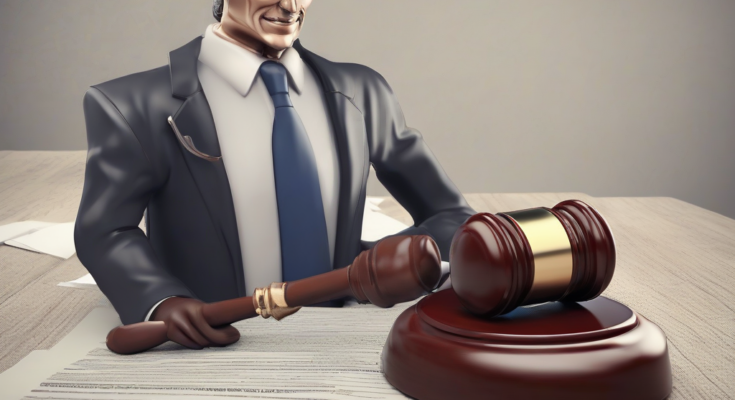Navigating the Complexities of Personal Injury: Your Guide to Finding and Working with a PA Personal Injury Attorney
Suffering a personal injury can be a devastating experience, impacting your physical well-being, financial stability, and emotional state. In Pennsylvania, navigating the legal complexities of personal injury claims requires expert guidance. This comprehensive guide explores the crucial role of a PA personal injury attorney, the process of selecting the right one, and the essential steps involved in pursuing your claim.
Understanding Personal Injury Law in Pennsylvania
Pennsylvania’s personal injury laws are designed to compensate individuals harmed due to the negligence or wrongful actions of others. This includes a wide range of situations, such as:
- Car accidents
- Truck accidents
- Motorcycle accidents
- Pedestrian accidents
- Bicycle accidents
- Slip and fall accidents
- Medical malpractice
- Nursing home negligence
- Product liability
- Premises liability
- Dog bites
- Construction accidents
To successfully pursue a personal injury claim, you must prove several key elements: duty of care, breach of duty, causation, and damages. A skilled PA personal injury attorney can help you gather evidence, build a strong case, and negotiate with insurance companies to secure the compensation you deserve.
The Crucial Role of a PA Personal Injury Attorney
A PA personal injury attorney acts as your advocate, guiding you through the often-complex legal process. Their expertise encompasses various aspects of personal injury litigation, including:
- Investigating the accident: Gathering evidence such as police reports, witness statements, medical records, and photos of the accident scene.
- Determining liability: Identifying the responsible party and proving their negligence or wrongful actions.
- Negotiating with insurance companies: Dealing with insurance adjusters who often attempt to minimize your settlement.
- Filing a lawsuit: If a settlement cannot be reached, your attorney will file a lawsuit on your behalf.
- Preparing for trial: Gathering evidence, deposing witnesses, and presenting your case before a judge or jury.
- Calculating damages: Determining the full extent of your losses, including medical expenses, lost wages, pain and suffering, and property damage.
Beyond legal expertise, a good attorney provides emotional support during a difficult time, offering guidance and reassurance throughout the process.
Finding the Right PA Personal Injury Attorney
Choosing the right attorney is crucial to the success of your case. Consider these factors when conducting your search:
- Experience: Look for an attorney with a proven track record in handling personal injury cases in Pennsylvania. Review their experience with cases similar to yours.
- Reputation: Check online reviews, testimonials, and professional ratings to gauge the attorney’s reputation and client satisfaction.
- Communication: Choose an attorney who communicates clearly and effectively, keeping you informed throughout the legal process.
- Fees: Most personal injury attorneys work on a contingency fee basis, meaning they only get paid if you win your case. Understand their fee structure and any associated costs.
- Specialization: Some attorneys specialize in specific areas of personal injury law, such as car accidents or medical malpractice. Consider an attorney with expertise in your type of case.
- Client References: Ask the attorney for references from previous clients. Speaking with individuals who have worked with the attorney can offer valuable insights.
The Personal Injury Claim Process
The process of pursuing a personal injury claim generally involves the following steps:
- Initial Consultation: Meet with potential attorneys to discuss your case and ask questions.
- Investigation: The attorney will investigate the accident and gather evidence.
- Demand Letter: A formal letter outlining your claim and demanding compensation from the responsible party’s insurance company.
- Negotiation: The attorney will negotiate with the insurance company to reach a settlement.
- Filing a Lawsuit: If negotiations fail, the attorney will file a lawsuit on your behalf.
- Discovery: Both sides exchange information and evidence relevant to the case.
- Trial Preparation: The attorney will prepare for trial if a settlement cannot be reached.
- Trial: The case is presented before a judge or jury.
- Settlement or Judgment: The case concludes with a settlement or a court judgment.
Common Challenges in PA Personal Injury Cases
Personal injury cases in Pennsylvania can present several challenges:
- Insurance Company Tactics: Insurance companies often employ tactics to minimize payouts, such as lowball offers and aggressive negotiation strategies.
- Establishing Liability: Proving negligence or fault can be complex, particularly in cases with multiple parties involved.
- Proving Damages: Documenting the full extent of your medical expenses, lost wages, and other losses requires meticulous record-keeping.
- Statute of Limitations: Pennsylvania has specific time limits for filing personal injury lawsuits. Missing these deadlines can bar your claim.
- Complex Legal Procedures: Navigating the legal system can be confusing and overwhelming for individuals unfamiliar with the process.
Understanding Damages in a PA Personal Injury Case
Damages in a personal injury case represent the financial compensation you are entitled to for your losses. These can include:
- Economic Damages: These are quantifiable monetary losses, such as medical bills, lost wages, and property damage.
- Non-Economic Damages: These are intangible losses, such as pain and suffering, emotional distress, and loss of consortium (loss of companionship).
- Punitive Damages: These are awarded in cases of gross negligence or intentional wrongdoing to punish the defendant and deter future misconduct.
Accurately calculating and documenting these damages is crucial to securing a fair settlement or judgment.
Questions to Ask a Potential PA Personal Injury Attorney
Before hiring an attorney, ask these questions:
- What is your experience handling cases similar to mine?
- What is your fee structure?
- How will you keep me informed throughout the process?
- What is your strategy for handling my case?
- What is your success rate in cases like mine?
- Can you provide references from previous clients?
- What is your approach to negotiating with insurance companies?
- What is your experience with trials?
The Importance of Documentation
Maintaining thorough documentation throughout the process is critical. This includes:
- Medical records: Keep detailed records of all medical treatments, diagnoses, and prognoses.
- Police reports: Obtain copies of all police reports related to the accident.
- Witness statements: Gather contact information and statements from any witnesses.
- Photos and videos: Document the accident scene and your injuries with photos and videos.
- Financial records: Keep records of all medical bills, lost wages, and other expenses.
Protecting Your Rights After a Personal Injury in Pennsylvania
Seeking immediate medical attention and contacting a PA personal injury attorney are crucial steps after an accident. A skilled attorney can help you protect your rights and ensure you receive the compensation you deserve.

